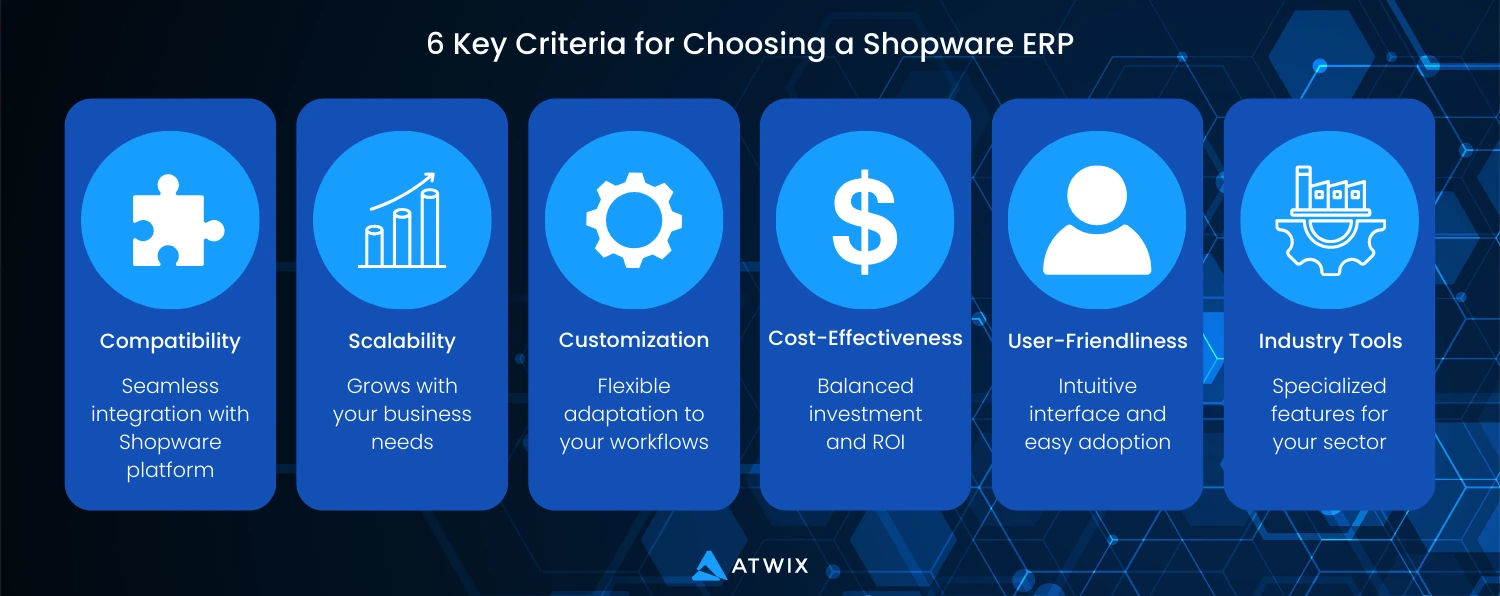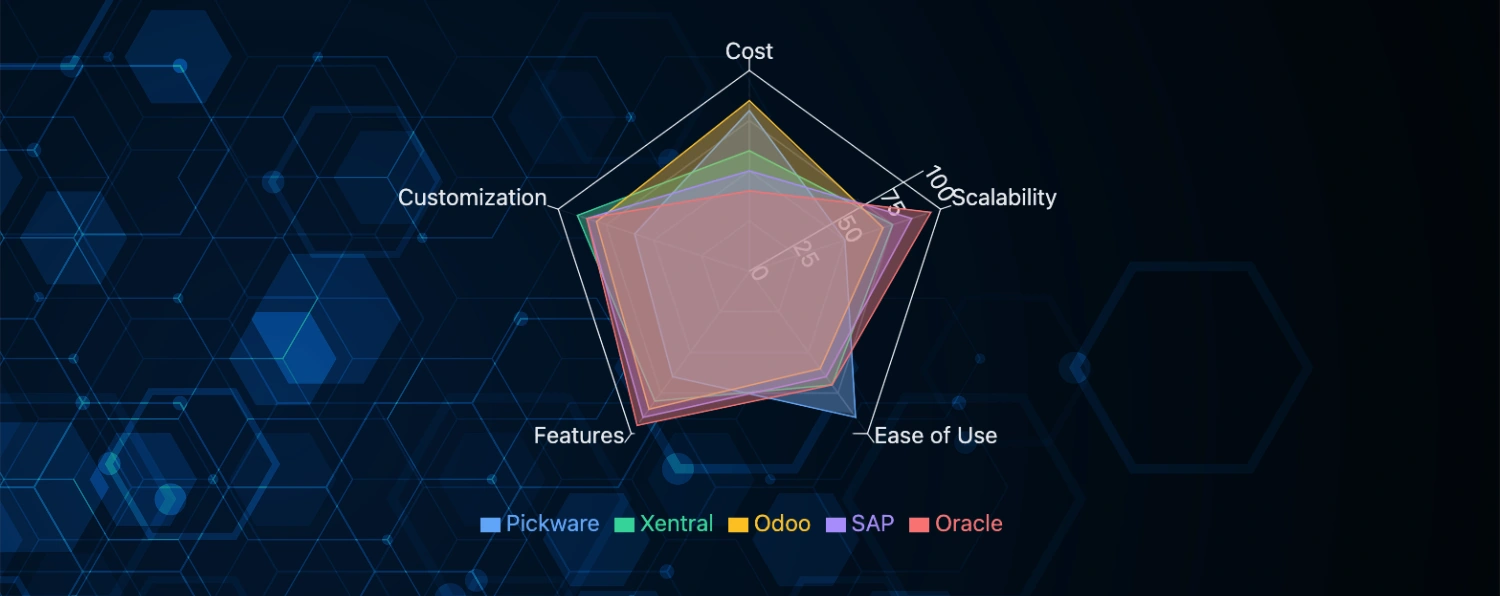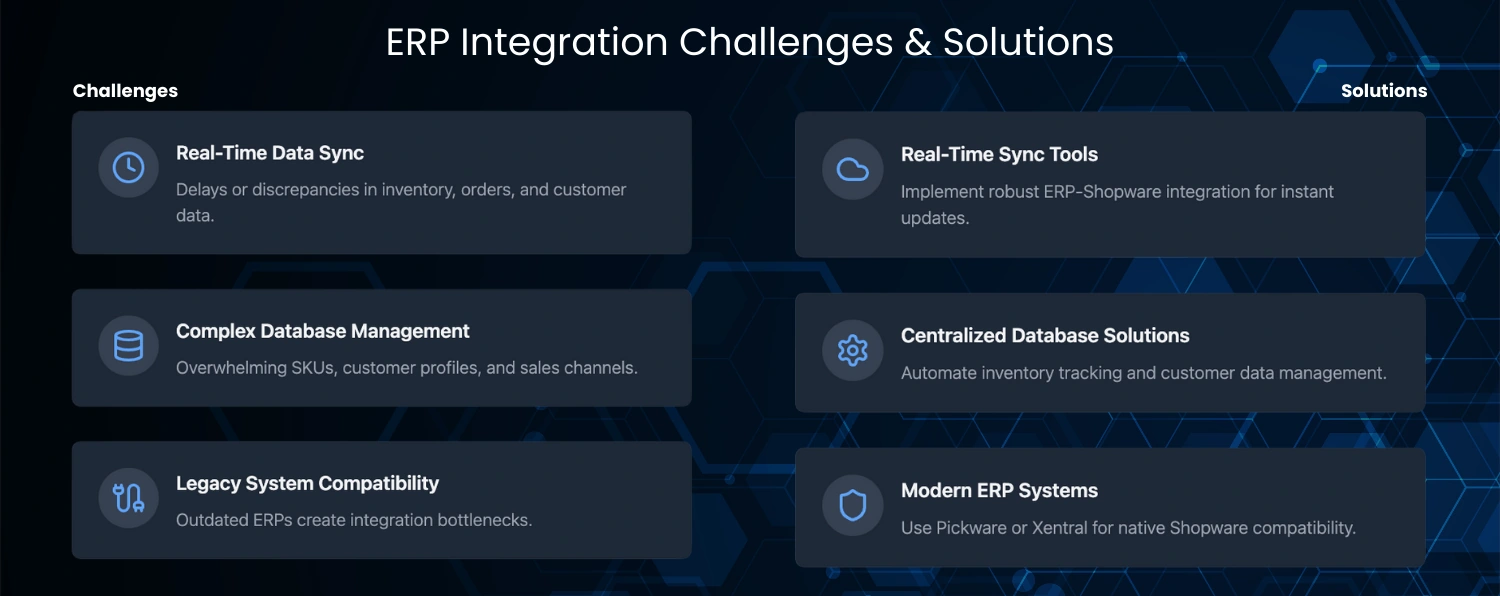Shopware ERP solutions offer a lifeline by enabling seamless integration between your eCommerce platform and core business processes. These systems automate workflows, enhance real-time data management, and position your business for long-term scalability. This guide explores the best ERP for Shopware, providing key insights, practical comparisons, and actionable advice to help you select the right solution for your needs.
Running a successful Shopware store means juggling multiple moving parts—inventory management, order processing, and data accuracy, all while meeting customer expectations. Without the right ERP system in place, these tasks can become bottlenecks, leading to higher costs and missed opportunities. A well-integrated Shopware ERP solution transforms these challenges into opportunities, streamlining operations and driving scalable growth.
Here’s what you’ll learn:
- The essential features to look for in Shopware ERP solutions.
- A detailed comparison of top ERP systems for Shopware.
- Expert tips for selecting and implementing the right ERP.
- Insights into overcoming integration challenges.
Explore how ERP integration can transform your Shopware store and take your eCommerce operations to the next level.
Criteria for Selecting Shopware ERP Solutions
Choosing the right Shopware ERP solution for your store is a critical decision that can make or break your eCommerce operations. Here are the key factors to consider:

1. Compatibility with Shopware
- Ensure the ERP solution supports seamless integration with Shopware, including real-time data synchronization and API compatibility.
- Look for systems that offer pre-built connectors to simplify the integration process.
2. Scalability
- Choose an ERP system that can grow with your business. Whether you’re managing a small startup or an enterprise-level operation, scalability ensures the ERP can handle increasing data volumes and user demands.
3. Customization and Flexibility
- Opt for an ERP solution that allows customization to meet your specific business workflows and requirements.
- Flexible systems adapt easily to changes, reducing long-term operational headaches.
4. Cost-Effectiveness
- Evaluate the total cost of ownership, including licensing fees, implementation costs, and ongoing maintenance.
- Balance affordability with functionality to ensure you get the best value for your investment.
5. User-Friendliness
- A user-friendly interface reduces the learning curve for your team and boosts productivity.
- Look for systems that offer intuitive dashboards, streamlined navigation, and robust training resources.
6. Industry-Specific Features
- Certain ERP solutions offer tailored features for specific industries, such as manufacturing, retail, or wholesale. Identify solutions that cater to your sector’s unique needs.
Key Features to Look for in a Shopware ERP Solution
Selecting the right Shopware ERP integration is vital to optimizing your eCommerce operations. Here are the most important Shopware ERP features to consider:
1. Real-Time Data Synchronization
- Real-time synchronization ensures that inventory, orders, and customer data are always up to date across all systems.
- This feature minimizes errors caused by manual updates, creating a more efficient Shopware ERP integration.
2. Scalability for Growth
- A scalable ERP system adapts to the needs of growing businesses, whether you’re a startup or a large enterprise.
- With the right Shopware ERP features, you can manage increasing data volumes and user loads seamlessly.
3. Customization and Flexibility
- Customizable workflows allow businesses to tailor the ERP system to their specific needs.
- Flexible solutions ensure that your Shopware ERP integration evolves with your operations, reducing long-term disruptions.
4. Cost-Effectiveness
- ERP solutions streamline processes, helping reduce operational costs.
- Evaluate pricing models that align with your business size to ensure the best return on investment from your Shopware ERP features.
5. User-Friendliness
- A user-friendly interface enhances team productivity and reduces the learning curve.
- ERP systems with intuitive dashboards and navigation simplify daily operations, making your Shopware ERP integration more effective.
6. Industry-Specific Tools
- Industry-specific tools cater to unique needs, whether in retail, manufacturing, or wholesale.
- These Shopware ERP features provide insights and tools tailored to your sector’s challenges.
| Feature | Description |
| Real-Time Sync | Instant updates across sales channels and ERP. |
| API Compatibility | Enables seamless integration with Shopware. |
| Customizable Workflows | Tailored to specific operational needs. |
| Analytics & Reporting | Provides actionable business insights. |
Tailored ERP for
Your Shopware Store
Ready to explore tailored ERP solutions for your Shopware store? Contact Atwix today to get expert advice and assistance.

Selecting an ERP isn’t just about features—it’s about finding a solution that aligns with your business goals and integrates seamlessly with Shopware to drive measurable resultsYaroslav Rogoza
CTO of Atwix
Comparison of Popular ERP Solutions for Shopware
To help you make an informed decision, here’s a detailed comparison of some of the top ERP solutions for Shopware. Each system offers unique capabilities tailored to specific business needs, ensuring that you can find the perfect fit for your eCommerce operations.

1. Pickware ERP
- Overview: Pickware is a native ERP solution built specifically for Shopware, offering seamless integration with no additional connectors required.
- Features: Real-time inventory management, integrated shipping, and automated order processing.
- Ideal For: Small to medium-sized businesses looking for a straightforward ERP system tailored to Shopware.
- Pros:
- Easy setup with Shopware.
- User-friendly interface for quick onboarding.
- Cons:
- Limited scalability for larger enterprises.
2. Xentral ERP
- Overview: A modular ERP solution that integrates easily with Shopware, Xentral offers flexibility and scalability for diverse business needs.
- Features: Multi-channel inventory management, CRM integration, and robust financial tools.
- Ideal For: Businesses seeking a flexible, customizable ERP to centralize operations.
- Pros:
- Highly customizable modules.
- Excellent for scaling businesses.
- Cons:
- Higher initial setup costs.
3. Odoo ERP
- Overview: Odoo is an open-source ERP platform offering extensive customization and integration options with Shopware.
- Features: Sales management, advanced reporting, and marketing automation tools.
- Ideal For: Companies requiring an open-source ERP solution with broad capabilities.
- Pros:
- Cost-effective for startups.
- Extensive range of features.
- Cons:
- Requires technical expertise for customization.
4. SAP Business One
- Overview: A proven ERP system for small to midsize businesses, SAP Business One integrates seamlessly with Shopware for advanced data management.
- Features: Financial management, customer relationship tools, and detailed analytics.
- Ideal For: Enterprises looking for a robust and reliable ERP system.
- Pros:
- Trusted brand with strong support infrastructure.
- Comprehensive feature set.
- Cons:
- Higher operational costs.
5. Oracle NetSuite ERP
- Overview: A cloud-based ERP solution, Oracle NetSuite offers advanced features for large-scale businesses with global operations.
- Features: Supply chain management, financial automation, and real-time analytics.
- Ideal For: Enterprises requiring a scalable, cloud-based solution.
- Pros:
- Exceptional scalability.
- Advanced reporting capabilities.
- Cons:
- Premium pricing.
Comparison Table: Popular Shopware ERP Solutions
| ERP Solution | Key Features | Ideal For | Pros | Cons |
| Pickware | Real-time inventory management | SMBs | Easy setup, user-friendly | Limited scalability |
| Xentral | Multi-channel inventory management | Scaling businesses | Highly customizable | Higher setup costs |
| Odoo | Open-source flexibility | Startups, customizable needs | Cost-effective, broad tools | Requires technical expertise |
| SAP Business One | Financial & customer management | SMEs, enterprises | Reliable, comprehensive | Higher costs |
| Oracle NetSuite | Cloud-based scalability | Large enterprises | Advanced analytics | Premium pricing |
Find the Right
Shopware ERP
Want help choosing the best Shopware ERP software solution? Contact Atwix today for expert advice and implementation support.

Which ERP to Choose Based on Your Business Needs
Choosing the right ERP for your Shopware store is essential for streamlining operations and achieving long-term growth. Here’s how to determine the best fit among the top ERP solutions for Shopware:
1. Match ERP Solutions to Your Business Size
- Small and Medium Businesses (SMBs): Lightweight options like Pickware ERP and Odoo ERP are cost-effective choices. These systems deliver essential features, such as real-time inventory updates and sales tracking, while being easy to implement.
- Large Enterprises: For more complex operations, SAP Business One and Oracle NetSuite ERP stand out as advanced ERP solutions for Shopware. These systems offer scalability, detailed analytics, and robust financial management.
2. Prioritize Growth-Driven Features
- If your business is scaling rapidly, modular solutions like Xentral ERP are ideal. They allow you to expand functionalities, such as customer relationship management (CRM) or multi-channel integrations, as your business grows.
- For international operations, Oracle NetSuite ERP provides global support, ensuring seamless management across different regions.
3. Consider Industry-Specific Features
- Retailers and Wholesalers: Choose Pickware ERP, which integrates natively with Shopware and is tailored for inventory-heavy operations and shipping workflows.
- Manufacturers and Custom Businesses: Opt for Odoo ERP, an open-source platform that allows businesses to create custom workflows suited to their unique needs.
4. Address Core Challenges
- If you struggle with inventory inconsistencies, select ERP systems that excel in real-time data synchronization, such as SAP Business One.
- For businesses aiming to streamline financial operations, advanced solutions like Oracle NetSuite ERP offer automation and accurate reporting to reduce manual errors.
ERP Integration & Database Organization: The Core Challenge
Integrating an ERP system with your Shopware store is essential for streamlining operations and improving efficiency, but it comes with specific challenges. Here’s a breakdown of the most common obstacles and how to overcome them effectively:

Challenge 1: Real-Time Data Synchronization
- The Issue: Ensuring data consistency across Shopware and ERP systems is complex, especially for businesses with high order volumes or frequent inventory updates. Delays or discrepancies can frustrate customers and create operational inefficiencies.
- The Solution: Implement robust Shopware ERP integration tools that enable real-time synchronization. These tools update inventory levels, order statuses, and pricing instantly, ensuring consistency across all systems.
Challenge 2: Complex Database Management
- The Issue: Managing large databases with thousands of SKUs, multiple customer profiles, and diverse sales channels can overwhelm your systems and staff, leading to errors or delays.
- The Solution: Adopt advanced Shopware ERP database organization solutions that centralize data storage and automate processes. These systems simplify inventory tracking, customer data management, and order processing, saving time and reducing errors.
Challenge 3: Compatibility with Legacy Systems
- The Issue: Many businesses rely on outdated ERP systems or custom solutions that are not natively compatible with Shopware. This creates bottlenecks during integration.
- The Solution: Use middleware solutions or invest in modern ERP systems like Pickware ERP or Xentral, which offer seamless compatibility and eliminate the need for costly overhauls.
Challenge 4: Scalability for Future Growth
- The Issue: As your business expands, database complexity and operational demands increase. Without a scalable ERP solution, your system may struggle to keep up, leading to inefficiencies.
- The Solution: Opt for scalable ERP systems like Oracle NetSuite or SAP Business One. These solutions grow with your business, adapting to increasing data volumes, sales channels, and user requirements.
Let Atwix help you overcome ERP integration hurdles—contact us today for expert guidance!
Current Trends in ERP Solutions for Shopware
The ERP landscape is evolving rapidly, driven by advancements in technology and the growing complexity of eCommerce operations. Here are the key trends shaping the future of ERP solutions for Shopware:
1. Cloud-Based ERP Systems
Cloud ERP solutions are becoming the preferred choice for businesses of all sizes due to their flexibility, scalability, and ease of use. Unlike traditional on-premise systems, cloud-based ERPs like Oracle NetSuite provide real-time access to data, enable remote work capabilities, and reduce infrastructure costs.
- Impact on Shopware Businesses: Cloud-based ERPs ensure seamless integration across global operations, allowing businesses to manage inventory, sales, and customer data from anywhere.
- Why It Matters: With eCommerce moving toward more distributed operations, a cloud-based ERP ensures that your Shopware store stays agile and future-proof.
2. AI and Automation
The integration of Artificial Intelligence (AI) and automation is revolutionizing ERP systems, offering predictive analytics and smarter decision-making capabilities. Automation tools now handle repetitive tasks like inventory restocking, order tracking, and financial reporting.
- Example Use Case: An ERP system integrated with Shopware can predict inventory shortages based on past sales trends and automatically place restocking orders.
- Why It Matters: Businesses save time, reduce errors, and improve efficiency, giving them a competitive edge in the fast-paced eCommerce environment.
3. Industry-Specific Customizations
Modern ERP solutions are no longer one-size-fits-all. Industry-specific customizations cater to unique operational needs, from retail to manufacturing and beyond.
- Retail & Wholesale: Solutions like Pickware ERP are tailored for Shopware merchants, offering seamless inventory and shipping workflows.
- Manufacturing: Open-source ERPs like Odoo allow manufacturers to customize workflows for production scheduling and supply chain management.
- Why It Matters: Customizations maximize the ROI of ERP investments by addressing the specific challenges faced by businesses in their respective sectors.
4. Omni-Channel Capabilities
As businesses expand their presence across multiple sales channels—Shopware, marketplaces, and social media—ERP systems are evolving to handle the complexity of omni-channel operations.
- Example Use Case: Xentral ERP synchronizes data from various channels, providing a unified view of inventory, orders, and customer interactions.
- Why It Matters: Unified management across channels reduces errors, improves customer satisfaction, and drives higher sales.
5. Focus on Security and Compliance
Data security and regulatory compliance are becoming non-negotiable for ERP systems. Businesses must comply with standards like GDPR, especially when handling sensitive customer data.
- Enhanced Security Features: Advanced ERPs offer data encryption, access controls, and regular security updates to protect against breaches.
- Why It Matters: Compliance not only builds customer trust but also mitigates legal and financial risks.
The Bottom Line: Why ERP Matters for Shopware Businesses
Implementing the right ERP system is no longer optional—it’s essential for thriving in the competitive eCommerce landscape. For Shopware businesses, integrating an ERP solution ensures operational efficiency, data accuracy, and scalability to meet evolving market demands.
1. Streamlining Operations
ERP systems eliminate redundancies by centralizing data management, automating workflows, and synchronizing processes. This leads to faster order fulfillment, better inventory control, and improved customer experiences.
2. Driving Growth
With advanced analytics and reporting features, ERP solutions provide actionable insights to help businesses make informed decisions. Whether you’re expanding to new markets or optimizing current operations, the right ERP lays a strong foundation for sustainable growth.
3. Future-Proofing Your Shopware Store
The eCommerce landscape is rapidly evolving. Adopting an ERP solution with features like cloud capabilities, real-time synchronization, and AI-driven automation ensures your business stays agile and competitive.
Frequently Asked Questions
Got some questions? We’re here to answer. If you don’t see your question here, drop us a line with out Contact form.
What is the total cost of ownership for integrating an ERP with Shopware?
The total cost of ownership (TCO) depends on factors like the chosen ERP system, the complexity of your Shopware store, and any customizations required. TCO typically includes licensing fees, implementation costs, training, and ongoing maintenance. Contact Atwix for a tailored cost estimate based on your specific requirements.
How long does it take to implement an ERP solution with Shopware?
The implementation timeline varies based on the complexity of the ERP system, the level of customization, and the size of your eCommerce operation. On average, it can take 3 to 6 months, but Atwix ensures a streamlined process to minimize disruption to your business.
What support does Atwix provide during and after the ERP integration process?
Atwix offers comprehensive support throughout the integration process, including system setup, data migration, and real-time troubleshooting. Post-integration, our team provides ongoing support, performance monitoring, and updates to ensure your ERP system operates smoothly.
Can you customize ERP solutions for specific business workflows?
Yes, Atwix specializes in tailoring ERP systems for Shopware to meet the unique needs of your business. Whether you require custom workflows, specialized integrations, or industry-specific tools, our team ensures the ERP solution aligns perfectly with your operational goals.
What are the key advantages of using an ERP solution with Shopware?
Integrating an ERP solution with Shopware improves operational efficiency, ensures real-time data synchronization, and enhances customer experience. It also provides advanced analytics for better decision-making, making it an essential tool for scaling your eCommerce business.
You may also find interesting



